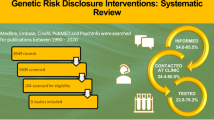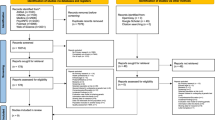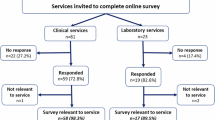Abstract
The communication of risk is a central activity in clinical genetics, with genetic health professionals encouraging the dissemination of relevant information by individuals to their at-risk family members. To understand the process by which communication occurs as well as its outcomes, a systematic review of actual communication in families about genetic risk was conducted. Findings from 29 papers meeting the inclusion criteria were summarised and are presented narratively. Family communication about genetic risk is described as a deliberative process, in which: sense is made of personal risk; the vulnerability and receptivity of the family member is assessed; decisions are made about what will be conveyed; and the right time to disclose is selected. The communication strategy adopted will depend on these factors and varies within families as well as between families. Inherent in these processes are conflicting senses of responsibility: to provide potentially valuable information and to prevent harm that may arise from this knowledge. However, the research ‘outcomes’ of communication have been professionally determined (number of relatives reported as informed, uptake of testing, knowledge of the recipient) and are typically unrelated to the concerns of the family member. The impact of communication on the individual, family members, and family relationships is of concern to the individual conveying the information, but this is largely self-reported. Currently, there is insufficient information to inform the development of theoretically and empirically based practice to foster ‘good’ communication. The implications for future research are discussed.
Similar content being viewed by others
Log in or create a free account to read this content
Gain free access to this article, as well as selected content from this journal and more on nature.com
or
References
Parker M, Lucassen A : Concern for families and individuals in clinical genetics. J Med Ethics 2003; 29: 70–73.
Godard B, Hurlimann T, Letendre M, Egalite N : Guidelines for disclosing genetic information to family members: from development to use. Fam Cancer 2006; 5: 103–116.
Wilson BJ, Forrest K, van Teijlingen ER et al: Family communication about genetic risk: the little that is known. Community Genet 2004; 7: 15–24.
Forrest K, Simpson SA, Wilson BJ et al: To tell or not to tell: barriers and facilitators in family communication about genetic risk. Clin Genet 2003; 64: 317–326.
Edwards A, Sivell S, Dundon J et al: Effective risk communication in clinical genetics: a systematic review. Cardiff: Cardiff University, 2006, p 249.
Dixon-Woods M, Bonas S, Booth A et al: How can systematic reviews incorporate qualitative research? A critical perspective. Qualitative Res 2006; 6: 27–44.
Hamilton RJ, Bowers BJ, Williams JK : Disclosing genetic test results to family members. J Nurs Scholarsh 2005; 37: 18–24.
Adelsward V, Sachs L : The messenger's dilemmas – giving and getting information in genealogical mapping for hereditary cancer. Health Risk Soc 2003; 5: 125–138.
Foster C, Eeles R, Ardern-Jones A, Moynihan C, Watson M : Juggling roles and expectations: dilemmas faced by women talking to relatives about cancer and genetic testing. Psychology and Health 2004; 19: 439–455.
Bonadona V, Saltel P, Desseigne F et al: Cancer patients who experienced diagnostic genetic testing for cancer susceptibility: reactions and behavior after the disclosure of a positive test result. Cancer Epidemiol Biomarkers Prev 2002; 11: 97–104.
Claes E, Evers-Kiebooms G, Boogaerts A, Decruyenaere M, Denayer L, Legius E : Communication with close and distant relatives in the context of genetic testing for hereditary breast and ovarian cancer in cancer patients. Am J Med Genet 2003; 116A: 11–19.
Hughes C, Lerman C, Schwartz M et al: All in the family: evaluation of the process and content of sisters' communication about BRCA1 and BRCA2 genetic test results. Am J Med Genet 2002; 107: 143–150.
Parsons EP, Clarke AJ, Bradley DM : Implications of carrier identification in newborn screening for cystic fibrosis. Arch Dis Child Fetal Neonatal Ed 2003; 88: 467–471.
d'Agincourt-Canning L : Experiences of genetic risk: disclosure and the gendering of responsibility. Bioethics 2001; 15: 231–247.
Landsbergen K, Verhaak C, Kraaimaat F, Hoogerbrugge N : Genetic uptake in BRCA-mutation families is related to emotional and behavioral communication characteristics of index patients. Fam Cancer 2005; 4: 115–119.
Hallowell N, Ardern-Jones A, Eeles R et al: Communication about genetic testing in families of male BRCA1/2 carriers and non-carriers: patterns, priorities and problems. Clin Genet 2005; 67: 492–502.
Peterson SK, Watts BG, Koehly LM et al: How families communicate about HNPCC genetic testing: findings from a qualitative study. Am J Med Genet 2003; 119: 78–86.
Hallowell N, Ardern-Jones A, Eeles R et al: Men's decision-making about predictive BRCA1/2 testing: the role of family. J Genet Couns 2005; 14: 207–217.
Kenen R, Arden-Jones A, Eeles R : Healthy women from suspected hereditary breast and ovarian cancer families: the significant others in their lives. Eur J Cancer Care 2004; 13: 169–179.
Gaff CL, Collins V, Symes T, Halliday J : Facilitating family communication about predictive genetic testing: probands' perceptions. J Genet Couns 2005; 14: 133–140.
Segal J, Esplen MJ, Toner B, Baedorf S, Narod S, Butler K : An investigation of the disclosure process and support needs of BRCA1 and BRCA2 carriers. Am J Med Genet 2004; 125: 267–272.
Denayer L, De Boeck K, Evers-Kiebooms G, Van den Berghe H : The transfer of information about genetic transmission to brothers and sisters of parents with a CF-child. Birth Defects Orig Artic Ser 1992; 28: 149–158.
Kenen R, Arden-Jones A, Eeles R : We are talking, but are they listening? Communication patterns in families with a history of breast/ovarian cancer (HBOC). Psychooncology 2004; 13: 335–345.
Mesters I, Ausems M, Eichhorn S, Vasen H : Informing one's family about genetic testing for hereditary non-polyposis colorectal cancer (HNPCC): a retrospective exploratory study. Fam Cancer 2005; 4: 163–167.
McGivern B, Everett J, Yager GG, Baumiller RC, Hafertepen A, Saal HM : Family communication about positive BRCA1 and BRCA2 genetic test results. Genet Med 2004; 6: 503–509.
Costalas JW, Itzen M, Malick J et al: Communication of BRCA1 and BRCA2 results to at-risk relatives: a cancer risk assessment program's experience. Am J Med Genet 2003; 119: 11–18.
Tercyak KP, Peshkin BN, DeMarco TA, Brogan BM, Lerman C : Parent–child factors and their effect on communicating BRCA1/2 test results to children. Patient Educ Counsel 2002; 47: 145–153.
Blandy C, Chabal F, Stoppa-Lyonnet D, Julian-Reynier C : Testing participation in BRCA1/2-positive families: initiator role of index cases. Genet Test 2003; 7: 225–233.
Keenan KF, Simpson SA, Wilson BJ et al: ‘It's their blood not mine’: who's responsible for (not) telling relatives about genetic risk? Health Risk Soc 2005; 7: 209–226.
Koehly LM, Peterson SK, Watts BG, Kempf KK, Vernon SW, Gritz ER : A social network analysis of communication about hereditary nonpolyposis colorectal cancer genetic testing and family functioning. Cancer Epidemiol Biomarkers Prev 2003; 12: 304–313.
Ayme S, Macquart-Moulin G, Julian-Reynier C, Chabal F, Giraud F : Diffusion of information about genetic risk within families. Neuromuscul Disord 1993; 3: 571–574.
Ormond KE, Mills PL, Lester LA, Ross LF : Effect of family history on disclosure patterns of cystic fibrosis carrier status. Am J Med Genet C Semin Med Genet 2003; 119: 70–77.
Binedell J, Soldan JR, Harper PS : Predictive testing for Huntington's disease: II. Qualitative findings from a study of uptake in South Wales. Clin Genet 1998; 54: 489–496.
Tercyak KP, Hughes C, Main D et al: Parental communication of BRCA1/2 genetic test results to children. Patient Educat Counsel 2001; 42: 213–224.
Green J, Richards M, Murton F, Statham H, Hallowell N : Family communication and genetic counseling: the case of hereditary breast and ovarian cancer. J Genet Counsel 1997; 6: 45–60.
Liede A, Metcalfe K, Hanna D et al: Evaluation of the needs of male carriers of mutations in BRCA1 or BRCA2 who have undergone genetic counseling. Am J Hum Genet 2000; 67: 1494–1504.
Lim J, Macluran M, Price M, Bennett B, Butow P : Short- and long-term impact of receiving genetic mutation results in women at increased risk for hereditary breast cancer. J Genet Couns 2004; 13: 115–133.
Clarke A, Richards M, Kerzin-Storrar L et al: Genetic professionals' reports of nondisclosure of genetic risk information within families. Eur J Hum Genet 2005; 13: 556–562.
Dugan RB, Wiesner GL, Juengst ET, O'Riordan M, Matthews AL, Robin NH : Duty to warn at-risk relatives for genetic disease: genetic counselors' clinical experience. Am J Med Genet 2003; 119C: 27–34.
Falk MJ, Dugan RB, O'Riordan MA, Matthews AL, Robin NH : Medical geneticists' duty to warn at-risk relatives for genetic disease. Am J Med Genet 2003; 120: 374–380.
Newson AJ, Humphries SE : Cascade testing in familial hypercholesterolaemia: how should family members be contacted? Eur J Hum Genet 2005; 13: 401–408.
Daly M, Barsevick A, Miller S et al: Communicating genetis test results to the family: a six step, skills building strategy. Fam Community Health 2001; 24: 13–26.
AMSTAR. Proposed Evaluation Tools for COMPUS: https://www.ccohta.ca/compus/compus_pdfs/COMPUS_Evaluation_Methodology_draft_e.pdf, Ottawa: Canadian Coordinating Office for Health Technology Assessment, 2005.
Lerman C, Peshkin B, Hughes C, Isaacs C : Family disclosure in genetic testing for cancer susceptibility: determinants and consequences. J Health Care Law Policy 1998; 1: 353–372.
Strathern M : The work of culture: an anthropological perspective In Clarke A, Parsons E (eds).: Culture, Kindship & Genes: Towards Cross-Cultural Genetics. Basingstoke: McMillan press, 1997.
Forrest L, Delatycki M, Skene L, Aitken M : Communicating genetic information in families – a review of guidelines and position papers. Eur J Human Genet 2007; 15: 612–618.
Acknowledgements
We thank all members of the GENVIEW steering group, especially Rhodri Evans, Jonathon Gray, Alastair Kent, Nicholas Lench, and Melissa Winter. Particular thanks go to Engy Hussein for her administrative support throughout the project and Dr Carma Bylund for useful discussions about family communication models. This project was funded by the Department of Health in the UK (Grant HSR03A). There are no conflicts of interest.
Author information
Authors and Affiliations
Corresponding author
Additional information
Supplementary Information accompanies the paper on European Journal of Human Genetics website (http://www.nature.com/ejhg)
Supplementary information
Rights and permissions
About this article
Cite this article
Gaff, C., Clarke, A., Atkinson, P. et al. Process and outcome in communication of genetic information within families: a systematic review. Eur J Hum Genet 15, 999–1011 (2007). https://doi.org/10.1038/sj.ejhg.5201883
Received:
Revised:
Accepted:
Published:
Issue date:
DOI: https://doi.org/10.1038/sj.ejhg.5201883
Keywords
This article is cited by
-
Interventions to support patients with sharing genetic test results with at-risk relatives: a synthesis without meta-analysis (SWiM)
European Journal of Human Genetics (2023)
-
Developing and assessing a kin keeping scale with application to identifying central influencers in African American family networks
Journal of Community Genetics (2023)
-
Cascade screening for beta-thalassemia in Pakistan: development, feasibility and acceptability of a decision support intervention for relatives
European Journal of Human Genetics (2022)
-
Patient-reported anticipated barriers and benefits to sharing cancer genetic risk information with family members
European Journal of Human Genetics (2022)
-
Survey on experiences and attitudes of parents toward disclosing information to children with genetic syndromes and their siblings in Japan
Scientific Reports (2022)



